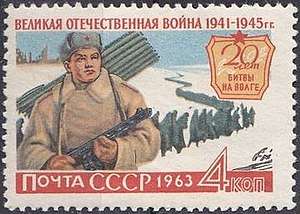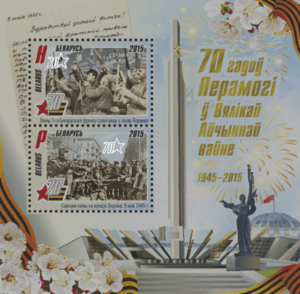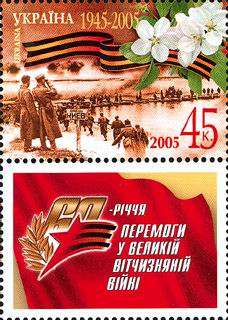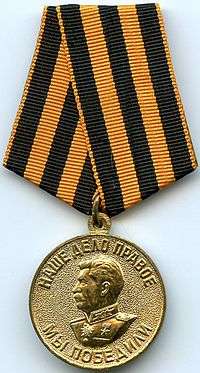Great Patriotic War (term)
The Great Patriotic War (Russian: Вели́кая Оте́чественная война́, romanized: Velikaya Otechestvennaya voyna; Ukrainian: Велика Вітчизняна війна, romanized: Velyka Vitchyzniana viyna; Belarusian: Вялікая Айчынная вайна, romanized: Vialikaja Ajčynnaja vajna)[lower-alpha 1] is a term used in Russia and other former republics of the Soviet Union (except for the Baltic states and Ukraine[1]) to describe the conflict fought during the period from 22 June 1941 to 9 May 1945 along the many fronts of the Eastern Front of World War II, primarily between the Soviet Union and Nazi Germany. For some legal purposes, this period may be extended to 11 May 1945 to include the end of the Prague Offensive.[2]


The end of the Great Patriotic War is commemorated on the 9th of May.
History
The term "Patriotic War" refers to the Russian resistance to the French invasion of Russia under Napoleon I, which became known as the Patriotic War of 1812. In Russian, the term отечественная война originally referred to a war on one's own territory (otechestvo means "the fatherland"), as opposed to a campaign abroad (заграничная война),[3] and later was reinterpreted as a war for the fatherland, i.e. a defensive war for one's homeland. Sometimes the Patriotic War of 1812 was also referred to as the Great Patriotic War (Великая отечественная война); the phrase first appeared no later than 1844[4] and became popular on the eve of the centenary of the Patriotic War of 1812.[5]
After 1914, the phrase was applied to World War I.[6] It was the name of a special war-time appendix to the magazine Theater and Life (Театр и жизнь) in Saint Petersburg, and referred to the Eastern Front of World War I, where Russia fought against the German Empire and the Austro-Hungarian Empire.[6] The phrases Second Patriotic War (Вторая отечественная война) and Great World Patriotic War (Великая всемирная отечественная война) were also used during World War I in Russia.[6]
The term Great Patriotic War re-appeared in the Soviet newspaper Pravda on 23 June 1941, just a day after Nazi Germany invaded the Soviet Union. It was found in the title of "The Great Patriotic War of the Soviet People" (Velikaya Otechestvennaya Voyna Sovetskogo Naroda), a long article by Yemelyan Yaroslavsky, a member of Pravda editors' collegium.[6] The phrase was intended to motivate the population to defend the Soviet fatherland and to expel the invader, and a reference to the Patriotic War of 1812 was seen as a great morale booster.
The term Отечественная война (Patriotic War or Fatherland War) was officially recognized by establishment of the Order of the Patriotic War on 20 May 1942, awarded for heroic deeds.
Usage
.jpg)
The term is not generally used outside the former Soviet Union, and the closest term is Eastern Front of World War II (1941-1945). Neither term covers the initial phase of World War II in Eastern Europe, during which the USSR, then still in a non-aggression pact with Germany, invaded eastern Poland (1939), the Baltic states (1940), and Bessarabia and Northern Bukovina (1940) and fought with Finland (1939-1940). [2][7]
In Russia and some other post-Soviet countries, the term is given great significance; it is accepted as a representation of the most important part of WWII. Uzbekistan is the only nation in the Commonwealth of Independent States that does not recognize the term, referring to it as World War Two as well as the Victory Day holiday as the Day of Remembrance and Honour.[8]
On 9 April 2015, the Ukrainian parliament replaced the term "Great Patriotic War" (Velyka vitchyzniana viina) in the country's law with "Second World War" (Druha svitova viina),[9] as part of a set of decommunization laws. The term is political; accepting it means accepting the Soviet Union's views on WWII, and rejecting the term means breaking away from the Soviet heritage, as in the case of Ukraine.
Notes
- Additional translations in languages of the former Soviet Union:
Azerbaijani: Бөјүк Вәтән мүһарибәси, Böyük Vətən müharibəsi; Estonian: Suur Isamaasõda; Armenian: Հայրենական Մեծ պատերազմ, Hajrenakan Mec paterazm; Georgian: დიდი სამამულო ომი, Didi Samamulo Omi; Kazakh: Ұлы Отан соғысы, Uly Otan soǵysy; Kyrgyz: Улуу Ата Мекендик согуш, Uluu Ata Mekendik soğuş; Lithuanian: Didysis Tėvynės karas; Latvian: Lielais Tēvijas karš; Moldovan: Мареле Рэзбой пентру апэраря Патрией, Marele Război pentru apărarea Patriei; Tajik: Ҷанги Бузурги Ватанӣ, Çangi Buzurgi Vatanī; Turkmen: Бейик Ватанчылык уршы, Beýik Watançylyk urşy; Tatar: Бөек Ватан сугышы, Böyek Watan suğışı; Uzbek: Улуғ Ватан уруши, Ulug‘ Vatan urushi.
References
- Україна, Віталій Червоненко ВВС. Рада ухвалила "декомунізаційний пакет". BBC News Україна (in Ukrainian). Retrieved 2019-01-13.
- Федеральный закон № 5-ФЗ от 12 января 1995, "О ветеранах" (in Russian)
- For example, one of the books published shortly after the war was titled Письма русского офицера о Польше, Австрийских владениях, Пруссии и Франции, с подробным описанием похода Россиян противу Французов в 1805 и 1806 году, также отечественной и заграничной войны с 1812 по 1815 год..." (Fyodor Glinka, Moscow, 1815–1816; the title was translated as "Letters of a Russian Officer on Poland, the Austrian Domains, Prussia and France; with a detailed description of the Russian campaign against the French in 1805 and 1806, and also the Fatherland and foreign war from 1812 to 1815..." in: A. Herzen, Letters from France and Italy, 1847-1851, University of Pittsburgh Press, 1995, p. 272).
- It can be found in Vissarion Belinsky's essay "Russian literature in 1843" first printed in magazine Otechestvennye Zapiski, vol. 32 (1844), see page 34 of section 5 "Critics" (each section has its own pagination).
- For example, several books had the phrase in their titles, as: П. Ниве, Великая Отечественная война. 1812 годъ, М., 1912; И. Савостинъ, Великая Отечественная война. Къ 100-лѣтнему юбилею. 1812—1912 г., М., 1911; П. М. Андріановъ, Великая Отечественная война. (1812) По поводу 100-лѣтняго юбилея, Спб., 1912.
- The dictionary of modern citations and catch phrases by K. V. Dushenko, 2006. (in Russian)
- Davies, Norman (2006). "Phase 1, 1939-1941: the era of the Nazi-Soviet pact". Europe at War 1939–1945: No Simple Victory. London: Macmillan. pp. 153–155. ISBN 9780333692851. OCLC 70401618.
- https://www.rferl.org/a/1058790.html
- Ukraine Purges Symbols of Its Communist Past, Newsweek, (10 April 2015)
External links
| Wikimedia Commons has media related to Great Patriotic War. |

